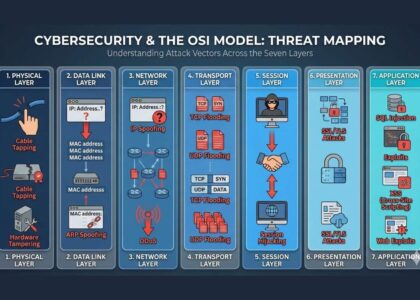In the rapidly evolving world of cybersecurity, tools play a crucial role in protecting systems, identifying vulnerabilities, and mitigating risks. Whether you’re an aspiring ethical hacker, a cybersecurity analyst, or a penetration tester, understanding these essential cybersecurity tools is critical. In this blog, we will explore some of the most important cybersecurity tools, detailing their functions and how they contribute to securing digital environments.
Cybersecurity Tools are:-
Wireshark
Wireshark is a powerful network protocol analyzer that allows security professionals to capture and analyze packets traveling through a network in real time. This tool is used for troubleshooting network issues, detecting security threats, and performing penetration testing. By examining the contents of network traffic, analysts can identify anomalies, unauthorized data transmissions, and potential cyber threats. Wireshark supports multiple protocols and provides a graphical interface that makes network monitoring easier. With its deep inspection capabilities, Wireshark remains a go-to tool for cybersecurity professionals.
Metasploit
Metasploit is one of the most widely used penetration testing frameworks, providing a platform to test the security of systems by simulating real-world attacks. Security professionals use Metasploit to identify vulnerabilities, develop exploits, and conduct security assessments. It includes a vast library of exploits, payloads, and auxiliary modules, allowing users to automate and streamline penetration testing. Metasploit helps ethical hackers understand how attackers may exploit system weaknesses, enabling them to develop effective defenses against cyber threats.
Nessus
Nessus is a widely used vulnerability scanner that helps organizations detect security vulnerabilities in their networks, systems, and applications. Developed by Tenable, Nessus offers comprehensive scanning capabilities, detecting misconfigurations, outdated software, and potential security gaps. It provides detailed reports with remediation recommendations, making it an essential tool for proactive security management. Nessus is particularly useful for compliance audits and risk assessments, ensuring that organizations stay ahead of cyber threats.
Nmap
Nmap (Network Mapper) is a powerful open-source tool used for network discovery and security auditing. It helps administrators and security professionals map out network infrastructure, identify active hosts, and detect open ports and services. Nmap’s scripting engine enables automated vulnerability detection, making it a valuable tool for penetration testing and network analysis. With its ability to perform stealth scans and detect operating systems, Nmap is an indispensable tool in cybersecurity arsenals.
Kali Linux
Kali Linux is a specialized operating system designed for penetration testing and ethical hacking. It comes preloaded with hundreds of security tools, including Wireshark, Metasploit, Nmap, and many more. Kali Linux provides a robust environment for cybersecurity professionals to test system defenses, conduct forensic investigations, and exploit vulnerabilities. It is widely used by ethical hackers, security researchers, and government agencies to assess network security and identify weaknesses before attackers do.
Firewalls
Firewalls serve as the first line of defense against cyber threats by monitoring and controlling incoming and outgoing network traffic. They can be hardware- or software-based and work by enforcing security rules to block unauthorized access. Firewalls prevent malicious activities such as hacking attempts, malware infections, and data breaches. Advanced firewalls offer features like intrusion detection and prevention, deep packet inspection, and application-layer filtering to enhance security.
Nikto
Nikto is an open-source web server scanner used to identify vulnerabilities in web applications and services. It performs extensive testing to detect outdated software, misconfigurations, and potential security loopholes. Nikto scans for known vulnerabilities and provides security professionals with detailed reports on their findings. By analyzing web servers, Nikto helps organizations strengthen their online presence against cyber threats.
Snort
Snort is an open-source intrusion detection and prevention system (IDPS) used to monitor network traffic for malicious activity. It analyzes packets in real-time and detects suspicious patterns based on predefined rules. Snort provides security teams with alerts when potential threats are identified, allowing them to take immediate action. It is widely used in enterprise environments to enhance network security and prevent cyberattacks.
Burp Suite
Burp Suite is a popular tool used for web application security testing. It helps security professionals assess web vulnerabilities by intercepting, modifying, and analyzing HTTP/S traffic. Burp Suite includes features like an automated scanner, intruder, repeater, and decoder, making it a comprehensive solution for identifying security flaws. It is widely used in penetration testing to find weaknesses in web applications and ensure their security.
John the Ripper
John the Ripper is a well-known password-cracking tool used by ethical hackers and security researchers. It can test the strength of passwords by performing dictionary attacks, brute force attacks, and rainbow table attacks. John the Ripper supports various encryption formats, making it a versatile tool for penetration testing. By identifying weak passwords, organizations can implement stronger authentication mechanisms to protect their systems.
Penetration Testing
Penetration testing, or ethical hacking, is a critical process in cybersecurity that involves simulating cyberattacks to identify vulnerabilities in a system. It helps organizations assess their security posture, discover weaknesses, and implement necessary security measures. Penetration testing tools like Metasploit, Kali Linux, and Burp Suite aid security professionals in evaluating and improving system defenses against real-world threats.
Aircrack-ng
Aircrack-ng is a suite of tools used for assessing Wi-Fi network security. It specializes in capturing and analyzing wireless packets, cracking WEP and WPA/WPA2 encryption, and testing network vulnerabilities. Aircrack-ng is commonly used by ethical hackers and penetration testers to secure wireless networks and prevent unauthorized access.
Antivirus Software
Antivirus software protects computers from malware, viruses, and other cyber threats. It detects, prevents, and removes malicious programs that can compromise system integrity. Modern antivirus solutions use artificial intelligence and machine learning to detect zero-day threats and advanced malware. Essential for both personal and corporate security, antivirus software is a fundamental cybersecurity defense mechanism.
Packet Sniffers
Packet sniffers are tools used to capture and analyze network traffic. These tools help security professionals monitor data flow, detect anomalies, and identify potential security threats. Wireshark is one of the most widely used packet sniffers, allowing real-time network analysis and troubleshooting.
Encryption
Encryption is a security mechanism that protects sensitive data by converting it into unreadable code. It ensures data confidentiality and integrity, preventing unauthorized access. Encryption is used in secure communications, online transactions, and data storage to safeguard information from cyber threats.
Managed Detection Services
Managed Detection and Response (MDR) services provide continuous monitoring and threat detection for organizations. These services use advanced security tools, artificial intelligence, and human expertise to identify and respond to cyber threats. MDR services help businesses enhance their security posture without requiring in-house security teams.
Splunk
Splunk is a powerful security information and event management (SIEM) tool used for analyzing and visualizing machine-generated data. It helps organizations detect security incidents, monitor logs, and gain insights into potential threats. Splunk’s real-time data processing capabilities make it an essential tool for security operations.
Cain and Abel
Cain and Abel is a password recovery tool used for cracking passwords, sniffing network traffic, and performing cryptanalysis. It is commonly used by security professionals to recover lost passwords and assess password security vulnerabilities.
NetStumbler
NetStumbler is a wireless network discovery tool used to detect Wi-Fi networks, measure signal strength, and identify network vulnerabilities. It is often used for wardriving and testing wireless security.
Cyber Protect
Cyber Protect is an integrated cybersecurity solution that combines backup, disaster recovery, and threat protection. It helps organizations protect data and systems from cyber threats while ensuring business continuity.
DDoS Tools
DDoS (Distributed Denial of Service) tools are used to test network resilience against large-scale attacks. Ethical hackers use these tools to simulate attacks and assess network defenses.
Web Vulnerability Scanning Tools
These tools, such as Nessus and Nikto, scan web applications for vulnerabilities, misconfigurations, and security weaknesses, helping organizations strengthen their online security.
Network Security Monitoring Tools
Tools like Snort and Splunk monitor network traffic for potential threats, providing real-time alerts and insights into security incidents.
Nexpose
Nexpose is a comprehensive vulnerability management tool that scans networks, identifies security risks, and provides actionable remediation recommendations.
These cybersecurity tools are essential for securing digital assets, identifying vulnerabilities, and protecting against cyber threats.






